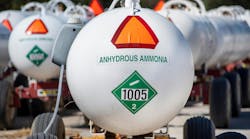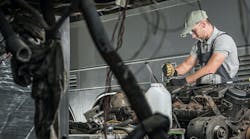If Ever there was a time to have a good maintenance program, it is now. Tough times demand a maintenance operation that is up to the challenges.
These certainly are tough times with the recession and accompanying credit crunch. Maintenance managers have to watch every penny and justify every expense. In many cases, fleets are extending trade intervals to squeeze as much extra life as they can out of their existing tractors and tank trailers.
Unplanned downtime and breakdowns out on the road could be financial killers in this economic environment. Those events can send operating costs soaring. In addition fleets with poorly maintained vehicles face steep fines from enforcement officials. In a worst-case scenario, the fleet could be shut down.
Keeping the fleet in good running order starts with a solid preventive maintenance effort. This applies to fleet operators that outsource their maintenance as well as those with their own repair shops.
Tractors and trailers still need regular service. It's understandable that some fleets may look at extended service intervals as a way to rein in maintenance costs. However, maintenance managers should proceed carefully and should work with their equipment suppliers to ensure that they don't jeopardize the reliability and safety of the vehicle.
Fleets with newer trucks probably can extend engine oil drain intervals beyond the traditional 25,000 to 30,000 miles, but they need to upgrade the filtration along with the oil. Mechanics need to keep an eye on the entire drivetrain to ensure that trucks continue to deliver the best possible fuel economy.
Tires and brakes are critical elements in the preventive maintenance process. Proper alignment and pressure are essential for achieving maximum tire life. The Technology & Maintenance Council notes that just 10% underinflation will shorten tread life by 9% to 16%. Underinflation also shortens casing life by increasing sidewall flexing, which generates excessive heat.
Brakes are every bit as important as tires. Brake linings and slack adjusters (even the automatic slack adjusters) need regular inspection and service.
Cargo tank inspections and tests must continue on the federally mandated schedules. Fleets that outsource tank testing and inspection need to use a reputable shop. Safety is the objective of the tests and inspections, and it must not be jeopardized.
Without question, maintenance managers must walk a tightrope, balancing the need for a safe, reliable fleet with the front office demands to find ways to cut costs.
Good warranty claims management continues to be a money-saving strategy. Maintenance managers need to keep a close watch on which vehicles and components are under warranty and what is covered. Claims reports need to be filled out properly and submitted on time.
Maintenance managers need to take a close look at staffing. For instance, does the shop have the right number of mechanics? How many work shifts are needed? Do they have the training, tools, and skills they need to keep up with vehicle technology?
Final point: This recession will end. The US economy will come back. Now is the time to begin planning for that recovery and make sure that the maintenance program has the flexibility to meet the opportunities that will emerge from a revived economy.








